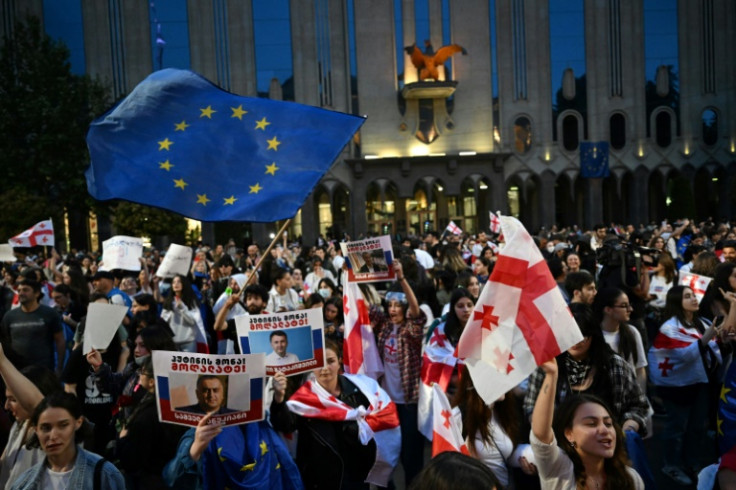Tens Of Thousands Protest Against Georgia 'Foreign Influence' Bill

Tens of thousands of people took to the streets in Georgia on Thursday in a fresh night of protests against a "foreign influence" bill likened to Russian laws silencing dissent.
Crowds blowing whistles and waving red and white Georgian flags and blue EU ones filled streets in the capital Tbilisi in the latest of weeks of demonstrations, AFP reporters saw.
The United States and United Nations spoke out against the legislation, with the UN human rights chief voicing concern about police violence towards protesters.
The Black Sea Caucasus nation has been gripped by mass anti-government protests since April 9, after the ruling Georgian Dream party reintroduced the bill, which critics see as repressive.
Unlike previous demonstrations in Tbilisi, Thursday's protests took place in two different locations: in front of parliament as on previous nights, but also on Heroes Square, home to a monument dedicated to fallen Georgian soldiers.
Police fired tear gas and arrested several protesters who had blocked the main road leading to Heroes Square.
Demonstrators in front of the parliament then headed to the square, shouting "No to Russia!" and holding up placards of Georgian Dream MPs they branded as "traitors".
"We are all together to show the Kremlin's puppets that we will not accept the government that goes against the Georgian people's wishes," said protester Giorgi Loladze, 27, from Kutaisi, Georgia's third-largest city.
The bill, which cleared its second reading in parliament on Wednesday, has come under fire from the European Union, United Nations and United States.
If adopted, the law would require that any independent NGO and media organisation receiving more than 20 percent of its funding from abroad register as an "organisation pursuing the interests of a foreign power".
"I urge Georgian authorities to withdraw this draft law, and to engage in dialogue, including with civil society and media organisations," UN rights chief Volker Turk said in a statement on Thursday.
He said the foreign-interests label "poses serious threats to the rights to freedom of expression and association".
US National Security Council spokesman John Kirby told reporters the United States was "deeply concerned by this legislation, what it could do in terms of stifling dissent and free speech".
Police violently broke up a demonstration against the bill earlier this week, firing tear gas, water cannon and rubber bullets, and beating and arresting scores of people.
Turk said he was "concerned by reports of unnecessary and disproportionate use of force" by law enforcement against protesters and the media, urging an investigation into allegations of mistreatment during protests or in detention.
Georgian Dream has defended the bill, saying it will increase transparency over NGOs' foreign funding. It says it aims to sign the measure into law by mid-May.
Last year, mass street protests forced Georgian Dream to drop plans for similar measures.
The latest turmoil comes ahead of parliamentary elections in October, seen as a key test of democracy in the EU-aspiring former Soviet republic.
Georgia has sought for years to deepen relations with the West, but Georgian Dream has been accused of attempting to steer the country closer to Russia.
Georgia's bid for membership of the EU and NATO is enshrined in its constitution and -- according to opinion polls -- supported by more than 80 percent of the population.

© Copyright AFP 2024. All rights reserved.











